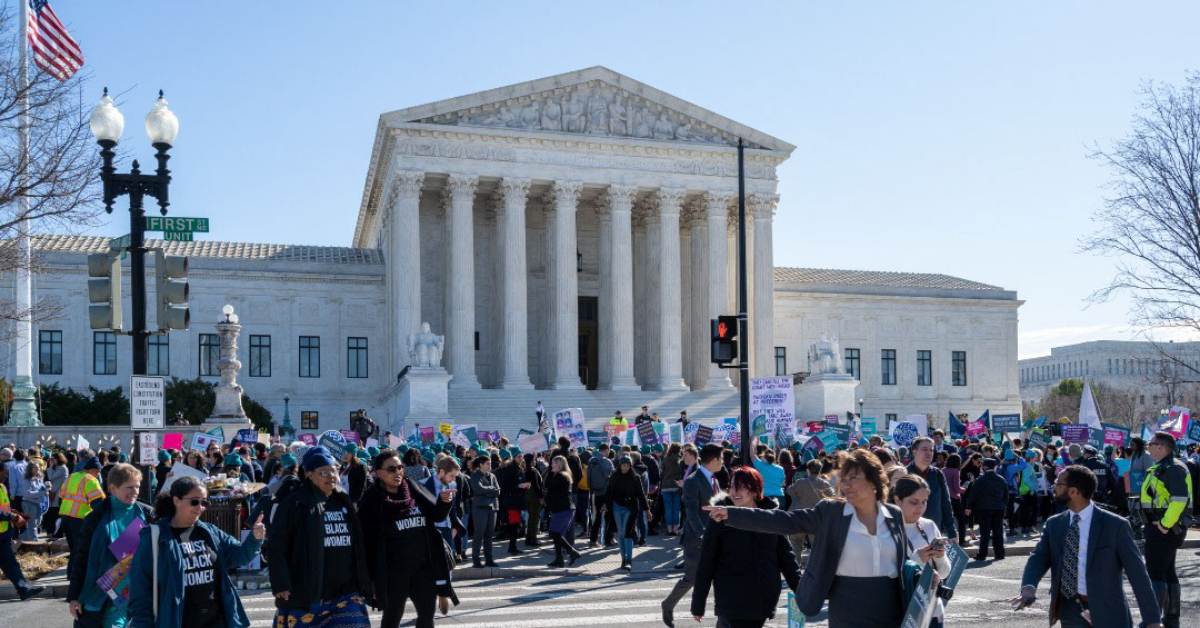1 min read
Supreme Court Issues New Standard for Religious Accommodations
Update: In late June, the Archbright Blog told you about a case to watch out for, Groff v. DeJoy, from the Supreme Court’s October 2022 term. It was...
3 min read
 Lindsey Sosa
:
Aug 5, 2022 5:37:42 PM
Lindsey Sosa
:
Aug 5, 2022 5:37:42 PM

After the US Supreme Court’s June 24 landmark decision to overturn Roe v. Wade, employers across the nation were left trying to understand the gravity of the impact on their workforce and the best way to support employees with their reproductive health.
While many states, including Washington and Oregon, will continue to protect women’s rights to an abortion, eight others, including Texas, Oklahoma, Arkansas, Mississippi, Alabama, Missouri, South Dakota, and Wisconsin, now prohibit abortions. More state-wide bans are expected, as well as restrictions and limitations to the procedure in even more states. Multistate employers are especially challenged with determining the best course of action if they have employees in impacted states.
It’s a complex and highly controversial topic, as some employees may identify as pro-life, and others may identify as pro-choice. In addition, diverse perspectives on abortion may come from customers and vendors. No matter the individual’s beliefs, conversations about abortion are emotionally charged, politically charged, and have traditionally been discouraged in the workplace – yet now, employers may find the subject impossible to avoid. Employers are wise to address the decision in some capacity and remind employees of their available legal rights, resources, and expectations for respectful communication with coworkers who don’t share the same beliefs.
Abortion is a medical procedure and employers typically provide medical benefits. As such, employers are wise to consult with their insurance broker to understand existing health plan coverage. In response to the Supreme Court’s decision, some high-profile companies announced their intention to provide employee travel benefits in states where the procedure is illegal. However, providing direct payment or reimbursement to employees for medical care can put the employer in the position of a health insurer. With that comes tax, Employee Retirement Income Security Act (ERISA), and Affordable Care Act (ACA) compliance obligations. It also raises employee privacy concerns – it is likely impossible for an employer to reimburse an employee for an abortion without first learning of the procedure. Employers should be aware that some states, like Texas, have passed a law allowing private citizens to sue anyone who "aids or abets" a prohibited abortion. This law could open employers in those states to litigation for funding or reimbursing an abortion. For these reasons, employers that want to provide coverage for the medical procedure and/or associated travel are encouraged to leverage the protection from a bonafide insurance plan.
Employees may be eligible for protected time away from work to get an abortion, whether the procedure is medically necessary or not. The federal Pregnancy Disability Act (PDA) provides that if an employee is temporarily unable to perform their job due to a medical condition related to pregnancy or childbirth, the employer must treat the employee in the same way as it treats any other temporarily disabled employee. Therefore, the employer may have to provide light duty, alternative assignments, disability leave, or unpaid leave to pregnant employees if it does so for other temporarily disabled employees.
The employee may also qualify for protection under the Americans with Disabilities Act (ADA). While pregnancy alone is not considered a disability under the ADA, a pregnancy-related impairment that substantially limits a major life activity (such as walking, standing, and lifting) or a major bodily function (such as the musculoskeletal, neurological, cardiovascular, circulatory, endocrine, and reproductive functions) would qualify as a disability. An employee who seeks an abortion due to a disability may be entitled to take ADA-protected leave unless the leave would be an undue hardship for the employer.
The Family and Medical Leave Act (FMLA) may also provide leave for an employee who seeks an abortion. The FMLA covers any eligible employee who experiences “incapacity due to pregnancy,” even if the related absence is shorter than three consecutive days. The time spent traveling to a state where they can undergo an abortion is also likely covered under the FMLA since the travel is intertwined with the necessary medical care.
Employers should treat any request for abortion leave in the same manner they do for other leave of absence requests and require the employee’s healthcare provider certification. The healthcare provider is the medical expert – not the employer. Employers reduce their risk by relying on an expert’s opinion for the need for leave rather than making assumptions or suppositions. In addition, HR should always keep this sensitive information confidential and related paperwork should remain in a separate, locked medical file.
In addition to federal job protection, employees who seek an abortion should be able to use their employer-provided sick leave benefit for any absences. State-paid family and medical leave plans would also likely cover an absence for a disability period resulting from pregnancy and abortion. In June, the Washington Paid Family and Medical Leave (WPFML) program added a bereavement benefit for employees for the seven days following the death of a child – it remains to be seen if an abortion would qualify an employee for this type of leave.
Leave options aside, there are also employee relations considerations. Employers should ensure that employees are never harassed, bullied, or retaliated against based on their stance on abortion. These actions may violate anti-harassment laws or policies based on the employee’s sincerely held religious beliefs. These protections apply in direct workplace interactions and online platforms like social media. In addition, employee opinions that are contrary to an organization’s response may be shared and protected under the National Labor Relations Act (NLRA). For instance, if an organization releases a public statement disagreeing with the Supreme Court decision, employees who don’t agree with that stance must be permitted to express their disagreement through email, verbal conversations, or, again, through social media.
 If your organization is struggling with how to respond to changing abortion laws and the impact on your workforce, Archbright can help. Eligible members have access to a comprehensive library of resources detailing each leave law described above and sample policies and forms to help administer the leaves. Access Archbright’s ADA Guide: Understanding the Impact of the Americans with Disabilities Act Keynote.
If your organization is struggling with how to respond to changing abortion laws and the impact on your workforce, Archbright can help. Eligible members have access to a comprehensive library of resources detailing each leave law described above and sample policies and forms to help administer the leaves. Access Archbright’s ADA Guide: Understanding the Impact of the Americans with Disabilities Act Keynote.
Eligible members may consult with Archbright’s Legal team for advice on how to respond to workplace discussions about abortion.
For more on membership information, contact info@archbright.com.

1 min read
Update: In late June, the Archbright Blog told you about a case to watch out for, Groff v. DeJoy, from the Supreme Court’s October 2022 term. It was...

The National Labor Relations Board (NLRB or the Board) frequently reviews employer work rules in employee handbooks or other policies to determine...

The United States Supreme Court issued several decisions in June, at the close of its 2022-2023 term, that either directly or potentially impact...